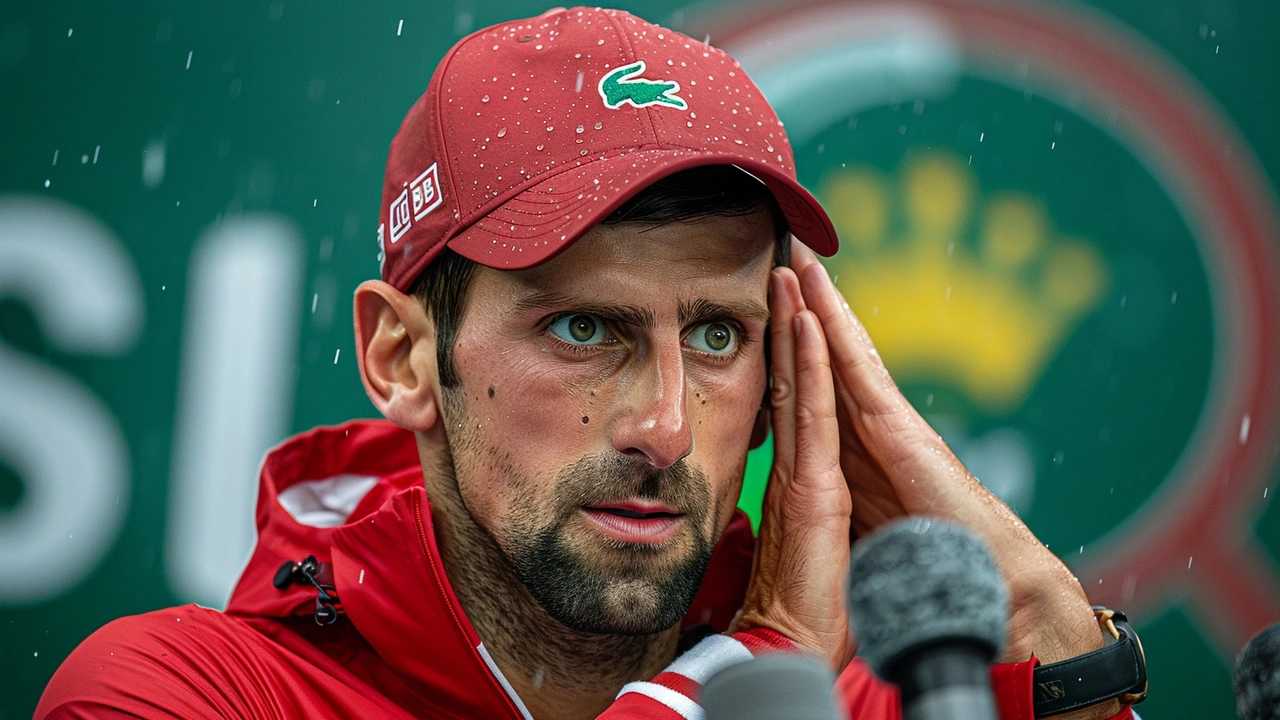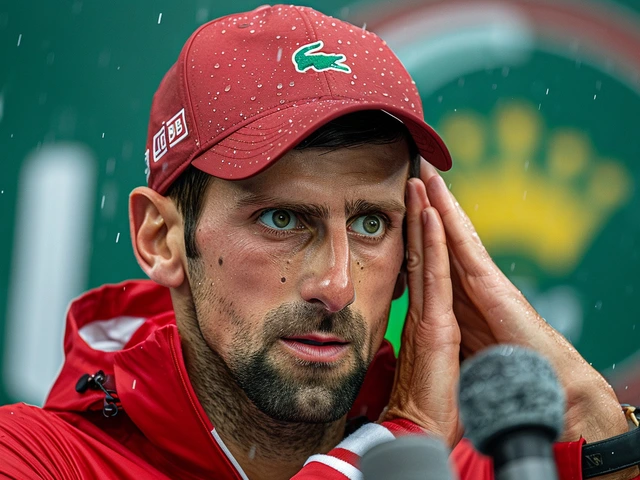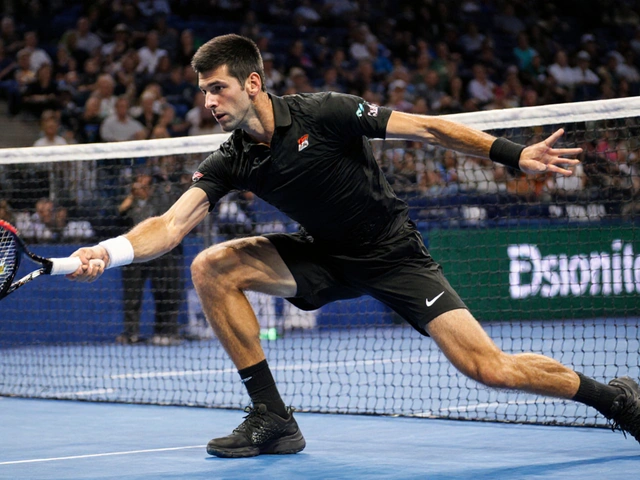Novak Djokovic Faces Uncertainty Over French Open Quarterfinal Due to Knee Injury
Novak Djokovic, one of the most celebrated tennis players in the world, has cast a shadow of doubt over his participation in the French Open quarterfinal against Casper Ruud. This uncertainty stems from a knee injury that Djokovic sustained during his gripping match against Francisco Cerundolo. As fans hold their breath and analysts speculate, Djokovic's potential withdrawal from the tournament could significantly impact the landscape of the competition.
The Incident and Initial Reactions
The injury occurred in the middle of a heated exchange with Cerundolo, a match that pushed both players to their limits. Djokovic, known for his resilience on the court, showed visible signs of distress as he clutched his knee in pain. Despite this setback, he fought through the remainder of the match, but his movements were noticeably hindered.
Post-match, Djokovic addressed the media with a mixture of hope and pessimism. “I don't know what will happen,” he admitted, reflecting the uncertainty surrounding his physical condition. This candid confession has only fueled concerns about his readiness for the subsequent stages of the French Open.
Potential Impact on the Tournament
If Djokovic were to withdraw, the tournament could face a significant shake-up. His presence alone attracts massive crowds and media attention, boosting the excitement and prestige of the matches he participates in. Without Djokovic, not only would fans feel the loss, but the dynamics of the competition would shift dramatically. Casper Ruud, Djokovic's slated opponent, might find his path unexpectedly altered, but he too would miss the invaluable experience of playing against a top-tier player.
The injury also casts a spotlight on the rigorous demands placed on professional tennis players. With intense match schedules and the pressure to perform consistently, injuries are an unfortunate yet inevitable part of the sport. Djokovic, who has shown remarkable endurance throughout his career, is not immune to these physical strains.
Medical Assessments and Recovery
As of now, Djokovic's team is working tirelessly to assess the extent of the knee injury. Medical experts are conducting thorough evaluations to determine the best course of action. Rest, physiotherapy, and possible medical interventions are all on the table as they strive to get Djokovic back to peak fitness. However, time is of the essence, and the quarterfinals loom large on the horizon.
In the context of his illustrious career, Djokovic has faced injuries before and has made impressive comebacks. This tenacity is part of what makes him such a compelling athlete. Fans and fellow players alike are hoping for a swift recovery, but realistic assessments must be made to avoid long-term damage.
Fan Reactions and Support
The tennis community has rallied around Djokovic during this uncertain time. Social media is ablaze with messages of support, and fans are eager for any updates on his condition. This incident has highlighted not only Djokovic's popularity but also the passion that tennis fans have for the sport and its players.
Many are sharing stories of Djokovic’s previous triumphs over adversity, drawing parallels and expressing hope that he will overcome this latest challenge. The outpouring of support underscores how deeply his presence is felt both on and off the court.
Future Implications for Djokovic's Career
Looking beyond the French Open, this injury might have broader implications for Djokovic's career. Every athlete must consider the long-term consequences of playing through pain, and Djokovic is no exception. His decision in the coming days will be crucial not only for his immediate participation in the tournament but for his future in tennis as well.
Speculations are rife about how this might affect his performance in upcoming tournaments. The tennis calendar is packed with pivotal matches that could determine rankings, endorsements, and legacies. Djokovic’s team will have to weigh these factors carefully as they decide the best path forward.
In Conclusion
The uncertainty surrounding Novak Djokovic's participation in the French Open quarterfinal against Casper Ruud due to his knee injury has thrown the tournament into a state of suspense. From the initial incident on the court to the ongoing medical evaluations, every moment is being watched intently by fans and analysts. The outcome of this situation could redefine the trajectory of the tournament and Djokovic's storied career. As we await further updates, one thing is certain: the world of tennis is holding its collective breath, hoping for the best but bracing for all possibilities.




Comments
It's unsettling to see top athletes gamble with their health for the sake of a tournament. The pressure to perform can be overwhelming, yet there is a responsibility to prioritize long‑term well‑being over short‑term glory. Playing through a serious knee injury might set a dangerous example for younger players. If Novak chooses to withdraw, he would be sending a clear message about the importance of listening to one's body. The sport benefits when its stars demonstrate prudence.
I totally get where you're coming from – it’s tough watching a champion in pain. 💜 Still, the love we have for Novak is also about wanting him healthy for future battles. His fans will understand if he steps back now, and the support will only grow stronger later. Whatever decision he makes, we’ll be here cheering him on.
Novak's situation is a reminder that even the most resilient athletes are not immune to the wear and tear of relentless competition. The knee injury he suffered on clay underscores how demanding the surface can be on joints. Every point contested adds stress, and the abrupt pivoting required in modern tennis amplifies the risk. While some might view withdrawal as a lack of toughness, the strategic choice to heal can extend a career. Rest now could prevent chronic issues that might end his run years earlier. The medical team’s assessment is crucial because a misdiagnosis can lead to compensatory injuries elsewhere. In this era of sports science, we have the tools to make informed decisions that balance immediate ambition with longevity. Novak has previously demonstrated an uncanny ability to bounce back from setbacks, proving his mental fortitude is as strong as his physical skill. Yet each comeback also carries the lesson that overexertion can be costly. By listening to his body, he models a healthy approach for aspiring players worldwide. The fans' passion, though intense, should also respect the athlete's need for recovery. The tournament itself will adapt, and a new champion will emerge, highlighting the depth of talent on the tour. It's a scenario where the narrative shifts from a single star to the broader competitive field. In the end, the decision will shape not only this French Open but also the roadmap of future seasons. Hopefully the outcome preserves both his health and his legendary status.
What a layered dilemma, indeed, the kind that forces us to weigh personal ambition against physical reality, and it's not just about one player, it's about the sport's culture, the expectations of fans, the pressures from sponsors, and the relentless calendar that leaves little room for recovery, and while some argue that champions should push through, others advocate for a more measured approach, emphasizing that longevity often stems from listening to those warning signs, and ultimately, the choice lies with Novak, his team, and his own assessment of what he can sustainably give to the game.
Hope he recovers quickly and comes back stronger!